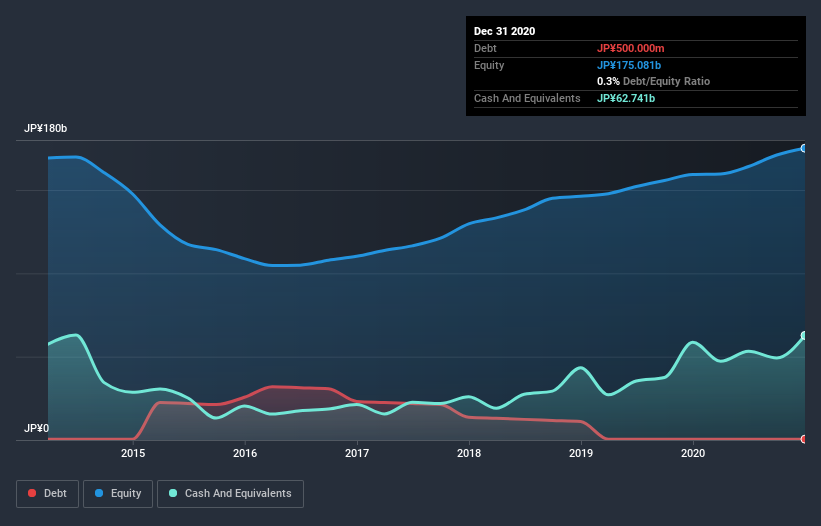
Warren Buffett famously said, 'Volatility is far from synonymous with risk.' It's only natural to consider a company's balance sheet when you examine how risky it is, since debt is often involved when a business collapses. We note that McDonald's Holdings Company (Japan), Ltd. (TYO:2702) does have debt on its balance sheet. But should shareholders be worried about its use of debt?
When Is Debt A Problem?
Debt and other liabilities become risky for a business when it cannot easily fulfill those obligations, either with free cash flow or by raising capital at an attractive price. In the worst case scenario, a company can go bankrupt if it cannot pay its creditors. However, a more usual (but still expensive) situation is where a company must dilute shareholders at a cheap share price simply to get debt under control. Of course, the upside of debt is that it often represents cheap capital, especially when it replaces dilution in a company with the ability to reinvest at high rates of return. The first thing to do when considering how much debt a business uses is to look at its cash and debt together.
Check out our latest analysis for McDonald's Holdings Company (Japan)
How Much Debt Does McDonald's Holdings Company (Japan) Carry?
As you can see below, McDonald's Holdings Company (Japan) had JP¥500.0m of debt, at December 2020, which is about the same as the year before. You can click the chart for greater detail. However, it does have JP¥62.7b in cash offsetting this, leading to net cash of JP¥62.2b.

A Look At McDonald's Holdings Company (Japan)'s Liabilities
We can see from the most recent balance sheet that McDonald's Holdings Company (Japan) had liabilities of JP¥50.0b falling due within a year, and liabilities of JP¥7.90b due beyond that. Offsetting these obligations, it had cash of JP¥62.7b as well as receivables valued at JP¥21.7b due within 12 months. So it actually has JP¥26.5b more liquid assets than total liabilities.
This short term liquidity is a sign that McDonald's Holdings Company (Japan) could probably pay off its debt with ease, as its balance sheet is far from stretched. Simply put, the fact that McDonald's Holdings Company (Japan) has more cash than debt is arguably a good indication that it can manage its debt safely.
Also good is that McDonald's Holdings Company (Japan) grew its EBIT at 15% over the last year, further increasing its ability to manage debt. There's no doubt that we learn most about debt from the balance sheet. But it is future earnings, more than anything, that will determine McDonald's Holdings Company (Japan)'s ability to maintain a healthy balance sheet going forward. So if you're focused on the future you can check out this free report showing analyst profit forecasts.
But our final consideration is also important, because a company cannot pay debt with paper profits; it needs cold hard cash. McDonald's Holdings Company (Japan) may have net cash on the balance sheet, but it is still interesting to look at how well the business converts its earnings before interest and tax (EBIT) to free cash flow, because that will influence both its need for, and its capacity to manage debt. Over the most recent three years, McDonald's Holdings Company (Japan) recorded free cash flow worth 68% of its EBIT, which is around normal, given free cash flow excludes interest and tax. This free cash flow puts the company in a good position to pay down debt, when appropriate.
Summing up
While we empathize with investors who find debt concerning, you should keep in mind that McDonald's Holdings Company (Japan) has net cash of JP¥62.2b, as well as more liquid assets than liabilities. And it impressed us with free cash flow of JP¥6.8b, being 68% of its EBIT. So we don't think McDonald's Holdings Company (Japan)'s use of debt is risky. Above most other metrics, we think its important to track how fast earnings per share is growing, if at all. If you've also come to that realization, you're in luck, because today you can view this interactive graph of McDonald's Holdings Company (Japan)'s earnings per share history for free.
If you're interested in investing in businesses that can grow profits without the burden of debt, then check out this free list of growing businesses that have net cash on the balance sheet.
When trading McDonald's Holdings Company (Japan) or any other investment, use the platform considered by many to be the Professional's Gateway to the Worlds Market, Interactive Brokers. You get the lowest-cost* trading on stocks, options, futures, forex, bonds and funds worldwide from a single integrated account. Promoted
New: Manage All Your Stock Portfolios in One Place
We've created the ultimate portfolio companion for stock investors, and it's free.
• Connect an unlimited number of Portfolios and see your total in one currency
• Be alerted to new Warning Signs or Risks via email or mobile
• Track the Fair Value of your stocks
This article by Simply Wall St is general in nature. It does not constitute a recommendation to buy or sell any stock, and does not take account of your objectives, or your financial situation. We aim to bring you long-term focused analysis driven by fundamental data. Note that our analysis may not factor in the latest price-sensitive company announcements or qualitative material. Simply Wall St has no position in any stocks mentioned.
*Interactive Brokers Rated Lowest Cost Broker by StockBrokers.com Annual Online Review 2020
Have feedback on this article? Concerned about the content? Get in touch with us directly. Alternatively, email editorial-team (at) simplywallst.com.
About TSE:2702
McDonald's Holdings Company (Japan)
McDonald's Holdings Company (Japan), Ltd.
Flawless balance sheet with proven track record.

